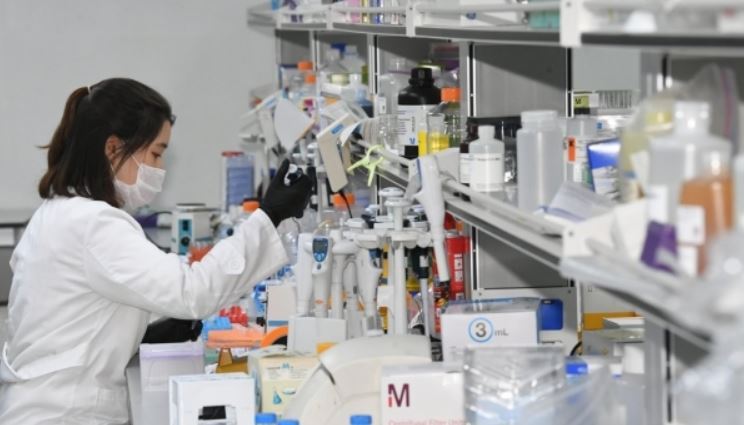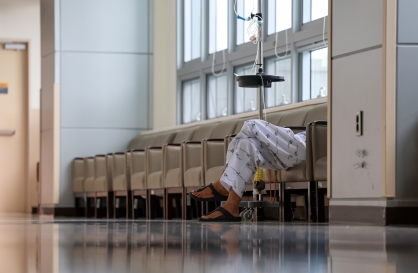Bio firms hope for faster research with ‘Cheomsaeng’ law in Aug.
By Lim Jeong-yeoPublished : July 13, 2020 - 18:31

A new law to fast-track the market entries of regenerative medicines and biologics drugs is to go into effect from next month. Relevant players in South Korea have been hoping the new rules will accelerate their development.
To be effective starting Aug. 28, the new bio law, nicknamed the “Cheomsaeng” law, seeks to ensure the safety of and support for cutting-edge regenerative medicine and biologics drugs. “Cheom” is short for “cheomdan,” which means “cutting-edge,” and “saeng” is short for “jaesaeng,” meaning “regenerative.”
The gist of this law is that it shortens the procedures for drug approval for innovative cell therapies and gene therapies in order to propel their market entry.
The law, for instance, enables developers to apply for earlier review for each step of drug development to shorten the approval process while minimizing uncertainties during their research.
The Cheomsaeng law was first proposed in 2016 to foster the biologics industry.
“It takes a painstakingly long time for the Drug Ministry to give the go-ahead for clinical trials,” said Cho Joong-myung, founder and president of innovative biotech CrystalGenomics. “And speed is quintessential to all drug development.
“Whatever change that comes from this new law, it had better recognize the importance of deregulating innovation in order for Korea to become a world-leading pharma hub,” Cho said, who has pursued oncology drugs and, more recently, a COVID-19 therapy.
The law met an unexpected hurdle last year when Kolon Life Science’s gene therapy drug Invossa was stripped of its license for having mislabeled the core ingredient. This year, Medytox’s botulinum toxin Meditoxin had its license revoked for having used an unauthorized substance for products manufactured between 2012 and 2015.
As these drugs had gained sales approval from the Drug Ministry, the apparent administrative oversight on the ministry’s part had set off alarm bells.
To offset safety concerns, the law dictates a 30-year follow-up of people who have participated in clinical trials of these drugs in their experimental phase.
The Drug Ministry has filed supplementary indexes as of July 8, where it details how the health care professionals handling these bio drugs must be trained with the law, and for the law practices to be reviewed for any update every three years.
By Lim Jeong-yeo (kaylalim@heraldcorp.com)
To be effective starting Aug. 28, the new bio law, nicknamed the “Cheomsaeng” law, seeks to ensure the safety of and support for cutting-edge regenerative medicine and biologics drugs. “Cheom” is short for “cheomdan,” which means “cutting-edge,” and “saeng” is short for “jaesaeng,” meaning “regenerative.”
The gist of this law is that it shortens the procedures for drug approval for innovative cell therapies and gene therapies in order to propel their market entry.
The law, for instance, enables developers to apply for earlier review for each step of drug development to shorten the approval process while minimizing uncertainties during their research.
The Cheomsaeng law was first proposed in 2016 to foster the biologics industry.
“It takes a painstakingly long time for the Drug Ministry to give the go-ahead for clinical trials,” said Cho Joong-myung, founder and president of innovative biotech CrystalGenomics. “And speed is quintessential to all drug development.
“Whatever change that comes from this new law, it had better recognize the importance of deregulating innovation in order for Korea to become a world-leading pharma hub,” Cho said, who has pursued oncology drugs and, more recently, a COVID-19 therapy.
The law met an unexpected hurdle last year when Kolon Life Science’s gene therapy drug Invossa was stripped of its license for having mislabeled the core ingredient. This year, Medytox’s botulinum toxin Meditoxin had its license revoked for having used an unauthorized substance for products manufactured between 2012 and 2015.
As these drugs had gained sales approval from the Drug Ministry, the apparent administrative oversight on the ministry’s part had set off alarm bells.
To offset safety concerns, the law dictates a 30-year follow-up of people who have participated in clinical trials of these drugs in their experimental phase.
The Drug Ministry has filed supplementary indexes as of July 8, where it details how the health care professionals handling these bio drugs must be trained with the law, and for the law practices to be reviewed for any update every three years.
By Lim Jeong-yeo (kaylalim@heraldcorp.com)



![[AtoZ into Korean mind] Humor in Korea: Navigating the line between what's funny and not](http://res.heraldm.com/phpwas/restmb_idxmake.php?idx=644&simg=/content/image/2024/04/22/20240422050642_0.jpg&u=)




![[Herald Interview] Why Toss invited hackers to penetrate its system](http://res.heraldm.com/phpwas/restmb_idxmake.php?idx=644&simg=/content/image/2024/04/22/20240422050569_0.jpg&u=20240422150649)

![[Graphic News] 77% of young Koreans still financially dependent](http://res.heraldm.com/phpwas/restmb_idxmake.php?idx=644&simg=/content/image/2024/04/22/20240422050762_0.gif&u=)




![[Exclusive] Korean military set to ban iPhones over 'security' concerns](http://res.heraldm.com/phpwas/restmb_idxmake.php?idx=652&simg=/content/image/2024/04/23/20240423050599_0.jpg&u=)



